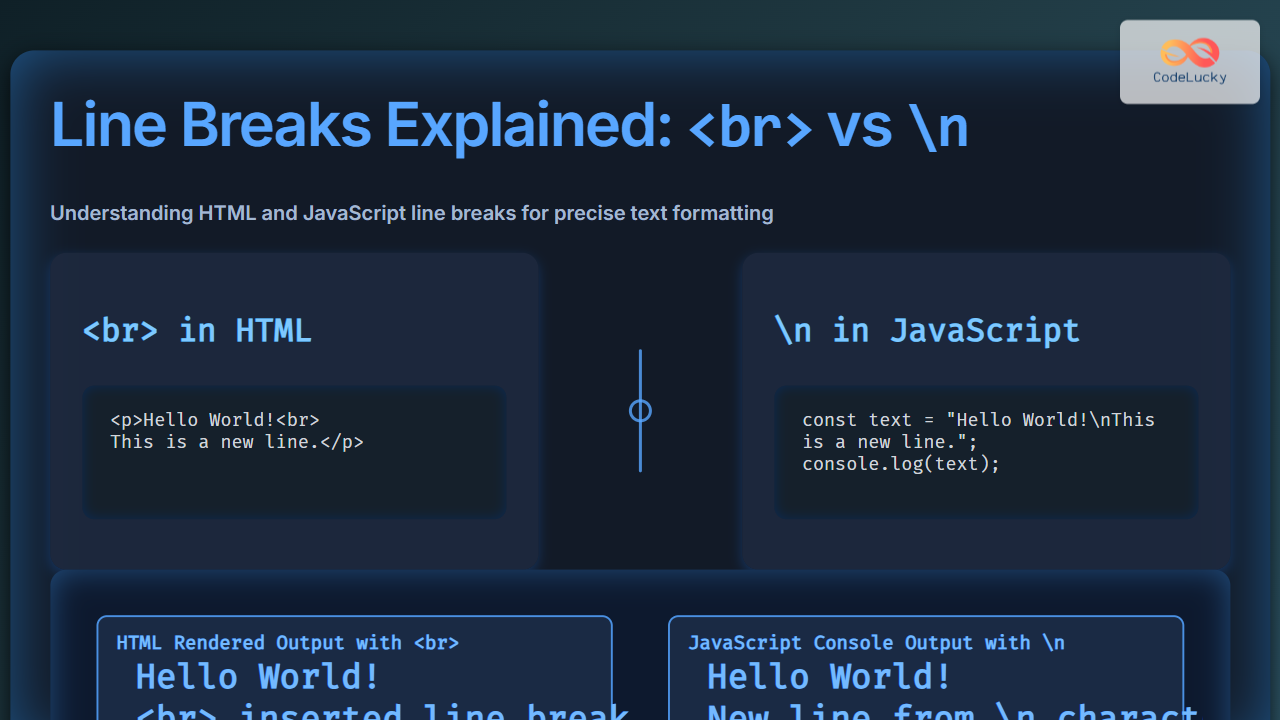JavaScript RegExp [^0-9]: Matching Non-digits
In JavaScript, regular expressions (RegExp) are powerful tools for pattern matching within strings. The character class [^0-9] is used to match any character that is not a digit (0-9). This can be extremely useful when you need to find or exclude numbers in your strings. This article delves into how to effectively use [^0-9] in your regular expressions with clear examples.
Purpose
The main purpose of [^0-9] is to match characters that are not digits. It’s the inverse of [0-9] or \d which match digits only. This is a character class negation, specifically for matching characters that aren’t numbers.
Syntax
const regex = /[^0-9]/;
Here, [^0-9] inside the regular expression will match any single character that is not a digit from 0 to 9.
Examples
Let’s explore how to use [^0-9] in various scenarios.
Basic Matching of Non-digits
This example demonstrates how to find the first non-digit character in a string.
const str1 = "abc123def";
const regex1 = /[^0-9]/;
const result1 = str1.match(regex1);
console.log(result1); // Output: ["a", index: 0, input: "abc123def", groups: undefined]
In this case, the regular expression finds the first character that is not a digit, which is "a" in the string "abc123def".
Global Matching of Non-digits
To find all non-digit characters in a string, you can use the g (global) flag.
const str2 = "abc123def456ghi";
const regex2 = /[^0-9]/g;
const result2 = str2.match(regex2);
console.log(result2); // Output: ["a", "b", "c", "d", "e", "f", "g", "h", "i"]
Here, the regular expression with the g flag finds all non-digit characters in the string.
Testing for Non-digits
You can use the test() method to check if a string contains any non-digit characters.
const str3 = "12345abc67890";
const regex3 = /[^0-9]/;
const result3 = regex3.test(str3);
console.log(result3); // Output: true
This returns true because the string contains non-digit characters ("abc").
Replacing Non-digits
You can use [^0-9] with the replace() method to remove or replace all non-digit characters in a string.
const str4 = "abc123def456ghi";
const regex4 = /[^0-9]/g;
const result4 = str4.replace(regex4, "");
console.log(result4); // Output: "123456"
This removes all non-digit characters, leaving only the numbers.
Matching Non-digits at the Beginning of a String
To check if a string starts with a non-digit character, combine [^0-9] with the ^ anchor.
const str5 = "abc123def";
const regex5 = /^[^0-9]/;
const result5 = regex5.test(str5);
console.log(result5); // Output: true
Here, the regular expression checks if the string begins with a non-digit character, which it does ("a").
Matching Non-digits at the End of a String
To check if a string ends with a non-digit character, combine [^0-9] with the $ anchor.
const str6 = "123def";
const regex6 = /[^0-9]$/;
const result6 = regex6.test(str6);
console.log(result6); // Output: true
This checks if the string ends with a non-digit character, which it does ("f").
Practical Examples
Validating Input
You can use [^0-9] to validate that an input field does not contain any digits.
<input type="text" id="inputField" />
<button onclick="validateInput()">Validate</button>
<script>
function validateInput() {
const inputField_script = document.getElementById("inputField");
const inputValue_script = inputField_script.value;
const regex_script = /[^0-9]/g;
if (regex_script.test(inputValue_script)) {
alert("Input is valid: Contains non-digit characters.");
} else {
alert("Input is invalid: Contains only digits.");
}
}
</script>
This example checks if the input field contains any non-digit characters and alerts the user accordingly.
Cleaning Data
Cleaning data often involves removing unwanted characters. Here’s how you can use [^0-9] to clean a phone number by removing all non-digit characters.
const phoneNumber = "+1 (555) 123-4567";
const cleanedNumber = phoneNumber.replace(/[^0-9]/g, "");
console.log(cleanedNumber); // Output: "15551234567"
This cleans the phone number by removing all spaces, parentheses, hyphens, and the plus sign, leaving only the digits.
Use Cases
- Data Validation: Ensuring that user input does not contain numeric characters in fields like names or addresses.
- Data Cleaning: Removing non-numeric characters from data such as phone numbers or IDs.
- Text Processing: Extracting or filtering out non-numeric parts of a text.
- Security: Sanitizing input to prevent injection attacks by removing non-numeric characters from sensitive fields.
Tips and Notes
- Combining
[^0-9]with other regular expression features such as anchors (^,$) and quantifiers (*,+,{}) can provide more specific matching. - Remember to use the
gflag when you want to find or replace all occurrences of non-digit characters in a string. - Be aware of character encoding issues, especially when dealing with international characters.
- Using character classes like
[^0-9]is generally more efficient than using the\Dshorthand for non-digits, as\Dcan sometimes include additional Unicode characters.
By mastering the use of [^0-9] in your JavaScript regular expressions, you can efficiently handle various text processing tasks, from data validation to data cleaning, making your code more robust and reliable.



















